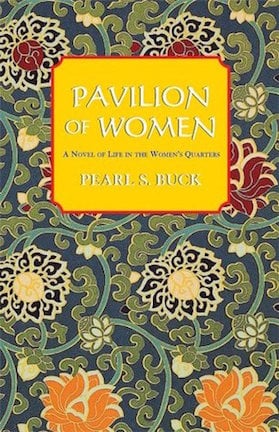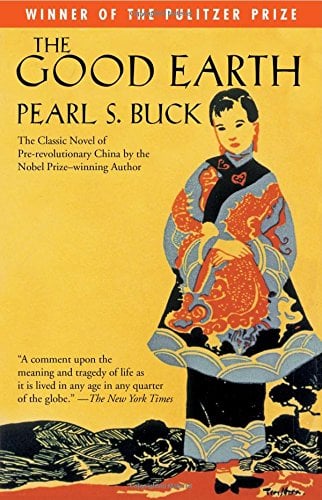Dragon Seed by Pearl S. Buck (1941) – a review
By Nava Atlas | On February 19, 2015 | Updated September 21, 2022 | Comments (0)

From the 1941 John Day Company edition of Dragon Seed (1941) by Pearl S. Buck: In Dragon Seed, Pearl Buck writes once more in the mood and vein of The Good Earth and The Mother.
Like those two classic novels this new one tells of plain people dwelling close to the Chinese soil, but a soil now sodden by the invader.
The story is of the farmer Ling Tan, and his wife and sons and daughters. The scene is outside and inside the walls of Nanking, the capital city where the author lived for seventeen years.
The action begins just before the Japanese assault, covering vividly the fall and pillaging of the city, and the life of the people afterward under the heels of a bestial master who rules but cannot conquer.
Everyday life in the face of war
Guerrillas, ardent boy and girl students, the merchant who stays to do business with the enemy, the young and strong who run away to fight, the peasants forced to grow opium, soldiers, puppet officials, courtesans — scores of moving portraits make the pattern of the novel not that of war, but of the lives of people going on in their ways, whatever the gods may send.
At its core lie the deep, stubborn thoughts on the madness of those who make war, drawn by a shrewd common man out of his long acquaintance with the large simplicities of the earth and sky and human destiny.
. . . . . . . . . . .

. . . . . . . . . . .
A 1941 review of Dragon Seed by Pearl S. Buck
This review is from The Ottawa Journal (Ottawa, Ontario, Canada), January, 1941: Dragon Seed: A Novel of China Today, by Pearl S. Buck, finds this distinguished novelist among the people she loves so dearly and understands so well.
More than any contemporary writer Pearl Buck has interpreted the Chinese to the modern world and focussed attention on those qualities of heart and mind which the Occidental races so slowly have some to appreciate.
To the Chinese the Dragon, traditional emblem of their race, is not a monster of hate and fury but a benign power of prosperity and peace.
The legend is that in the Hsia period two dragons fought a great duel until both disappeared leaving only a fertile foam from which were born the descendants of Hsia. Thus the dragons came to be looked upon as ancestors of a race of heroes.
Peasants caught up in conflict
As in The Good Earth the author here tells a story of peasants. Though not as poor as Wang Lung the present protagonist, Ling Tan, is a very small farmer indeed.
The soil he tills has been in his family for countless generations, and though Ling Tan can neither read nor write he knows out of his deep earth bound wisdom that when men have enough land to give them food they have nothing to quarrel about beyond the small things that a night’s sleep can change.
But when land is the cause men will kill each other. Also he thinks “it is the only thing our would-be conquerors cannot take back to their own cursed country.”
. . . . . . . . . .

You might also enjoy: Pavilion of Women by Pearl S. Buck
. . . . . . . . . .
A wife predicts strife
Outside the city of Nanking in the Spring of 1937 Ling Tan gazes with satisfaction across his broad lands. Two stalwart sons already married are planting seedlings in the fertile soil, while another sits on the water-buffalo grazing somewhere on the round grassy foothills along the valley.
Here is deep contentment born of close contact with the earth. As his ancestors had lived so he lives and the necessity to read and write or in any way improve his lot has not occurred.
But Jade, the wife of his second Lao Er, is beginning to fret. She can read and write and knows that evil things are astir. Shops displaying goods from the East Ocean Enemy are looted and destroyed and when a young leader of “Free China” addressing a rabble asks if they are strong enough to pursue a “scorched earth” policy when the enemy comes it is the lovely Jade who cries out “We are able.”
. . . . . . . . . . .
See also: The Good Earth by Pearl S. Buck. . . . . . . . . . .
Helplessness and despair of war
When the enemy like an obscene monster sprawls across the land completing with bestial ferocity the destruction dealt from the skies, and roads are jammed with city dwellers frantic in their helplessness and despair, the stolid farmer stays in his home.
Watching his children leave to join guerrilla bands of “Free China” in the hills Ling Tan in the hour of departure prepared for their return. To stay and take no suffering as cause to leave is his way of making war.
When four years have passed the sons return. But this time the East Ocean Enemy admits though he made war without declaring it he now cannot make peace though he declare it. Guerrillas supplied with guns by the enemy’s own quislings have once more proved that winning the battle does not mean conquering people.
But the sight of so much suffering has robbed Ling Tan even of pleasure in his land. If the harvest is good it must go to the enemy. In spite of every subtle indirection to avoid it the enemy claims his toll. If only there were hope in the sky! It seems sometimes that not only are men evil but Heaven could be evil too.
Survival by resistance
But one night his eldest son persuades him to go to a tea house where, by magic, words are picked out of the air. A leader of the great white race is speaking and he says:
“The ordeals of the conquered peoples will be hard. We must give them hope. We must give them conviction that their sufferings and resistances will not be in vain. The tunnel may be dark and long but at the end there is light.”
In a dark room filthy with years of ruin Ling Tan hears these brave words. His heart is hungry and the words fall into his heart like seeds. “These people who are against our enemy must then be with us.” So did the words take root in his heart.
With the great simplicity which distinguishes all her writing Pearl Buck portrays a noble, peace-loving nation surviving by sheer passive resistance. Nothing she has since written can match The Good Earth, but Dragon Seed is a worthy second place.
. . . . . . . . . . .

Leave a Reply